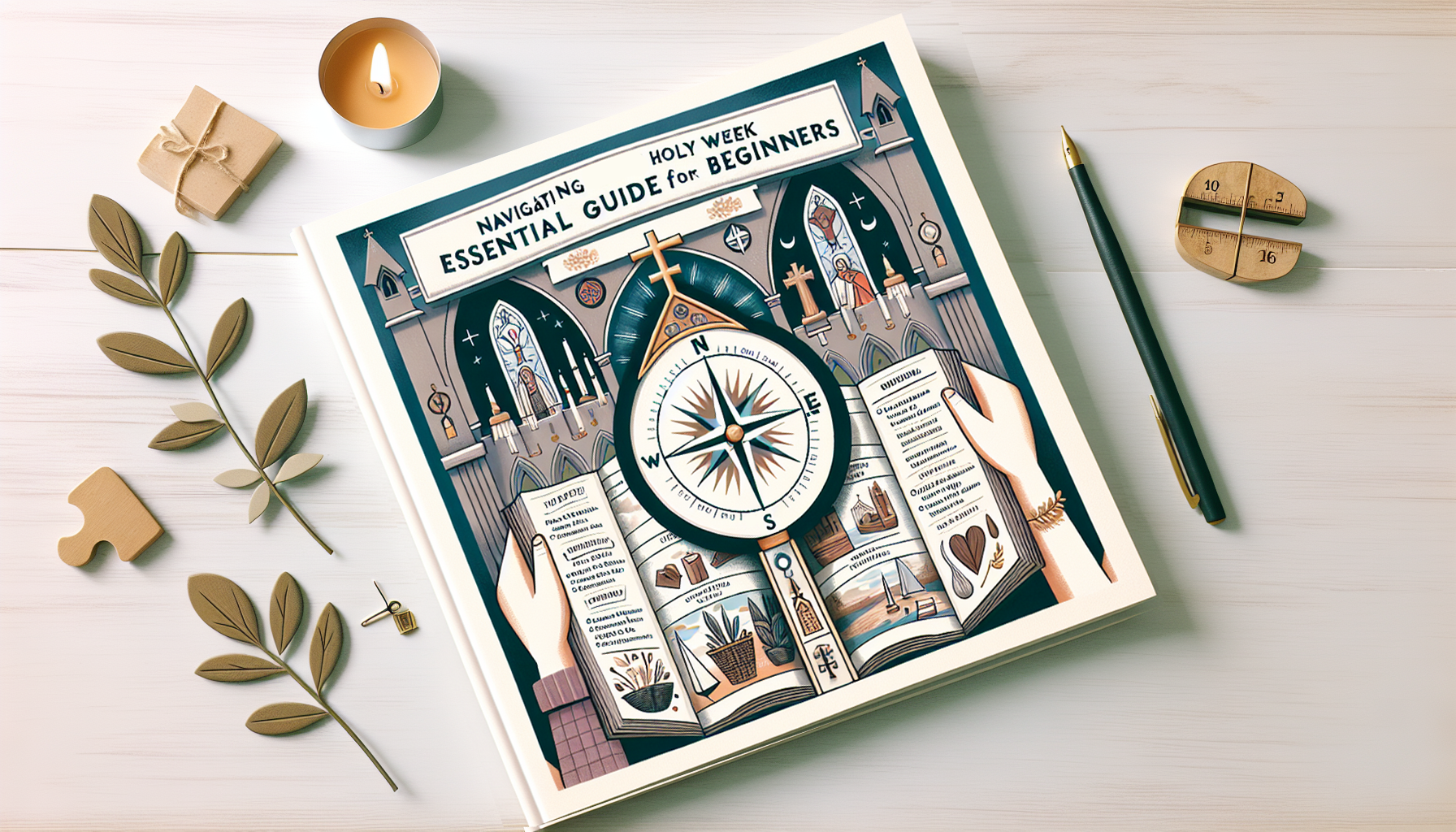I really can’t believe Lent is over. Easter is early this year for those of us in the West, but the Lenten season has just flown by. As we get ready to celebrate Palm Sunday, I decided to put together a few articles in preparation for Holy Week, and this is the first.
Journeying through Holy Week
Holy Week is the period between Palm Sunday and Easter Sunday and, as you probably already know, it's a holy time in Christianity. It stands as a unique intersection in our spiritual journey - we've spent the Lenten Season fasting and preparing for Easter, and we are so close. We start by entering Jerusalem with Christ and then prayerfully reflect on his last days.
It's not just a week, but it's the culmination of the liturgical year's anticipation, including Palm Sunday's triumphal entry, the reflective Thursday with its poignant Last Supper, the solemn mourning of Good Friday, and the silence of Holy Saturday leading up to the joyous Easter Sunday.
This guide to Holy Week is meant to help those new to the Anglican Tradition through this holy season days and services, shedding light on how and why observe the traditions and devotions that we do in the Episcopal Church.
As we prepare for this journey, let's explore the intricate tapestry of Holy Week, from the anointing at the Garden of Gethsemane to the profound silence of the Easter Vigil and the eventual discovery of the empty tomb. Each day offers us unique observations, readings, and prayers that help us journey and mysteriously participate in Christ's Passion, Death, and Resurrection. This guide isn't just to talk about what to expect, but instead is here to inspire all of us into deeper participation and appreciation of Holy Week, making it an essential companion for both newcomers and seasoned practitioners aiming to fully immerse in this sacred time.
Palm Sunday: The Triumphal Entry
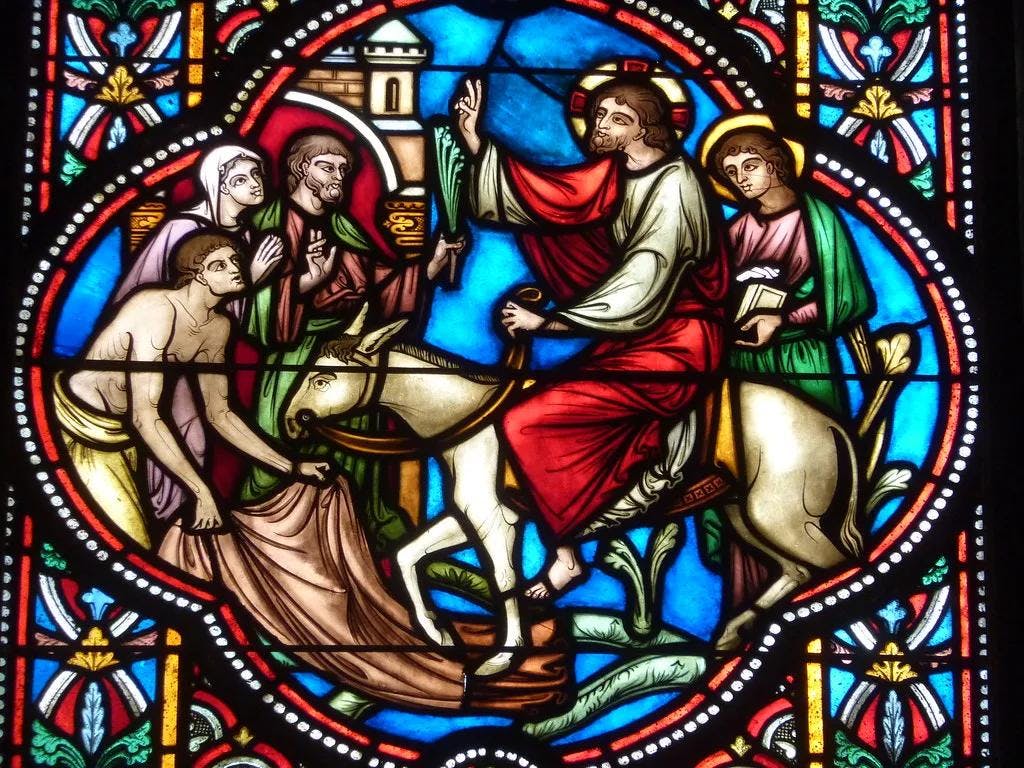
Palm Sunday marks the beginning of our Holy Week with a celebration that commemorates Jesus' triumphal entry into Jerusalem [1]. All Sunday services are a little Easter and have a celebratory nature, but this one is a bit unique: we, like those in Jerusalem, will welcome Christ with palms and hymns of celebration. Here's what you can expect on Palm Sunday morning:
Blessing of the Palms: Palm branches will be blessed and given to members of the congregation. As we do this, we are connected with those who welcomed Christ, our brothers and sisters in Christ around the world, and the faithful how have gone before us - this tradition dates back to the 4th century.
It is right to praise you, Almighty God, for the acts of love by which you have redeemed us through your Son Jesus Christ our Lord. On this day he entered the holy city of Jerusalem in triumph, and was proclaimed as King of kings by those who spread their garments and branches of palm along his way.
Let these branches be for us signs of his victory, and grant that we who bear them in his name may ever hail him as our King, and follow him in the way that leads to eternal life; who lives and reigns in glory with you and the Holy Spirit, now and for ever. Amen. Blessing of the Palms, BCP 271
Procession of the Palms: After we have our palsm, we'll process with them, holding and waving the branches as we sing. As we walk, we are symbolically joining the crowds greeting Jesus as he entered Jerusalem, our brothers and sisters in Christ around the world, and the faithful who have gone before us who worshiped as we are. [1]. This isn't just a recreation of an historical event, but it connects us with others and the Biblical story in a very real and tangible way.
The Passion of Christ: One thing that was new to me when I joined the Anglican Tradition, was the hard right we take when we read the a Passion Gospel recounting Jesus' arrest, trial, crucifixion, and death. This year we'll read from the Gospel According to St. Mark 14:1-15:47, recounting the plot to arrest Christ, His betrayal, trial, crucifixion, and removal from the cross. In the Christian East, the reading was only the Triumphant Entry into Jerusalem (Gospel according to St. John, 12:1-18). In our tradition, we will hear the deacon read a poignant reminder of what this week is building to - Christ's sacrifice for all of humanity.
So Palm Sunday not only commemorates Jesus' entry into Jerusalem but also invites us to reflect on the deeper meanings of humility, sacrifice, and redemption as Holy Week unfolds and we prepare to celebrate His glorious resurrection.
Almighty and everlasting God, who, of thy tender love
towards mankind, hast sent thy Son our Savior Jesus Christ
to take upon him our flesh, and to suffer death upon the
cross, that all mankind should follow the example of his
great humility: Mercifully grant that we may both follow the
example of his patience, and also be made partakers of his
resurrection; through the same Jesus Christ our Lord, who
liveth and reigneth with thee and the Holy Spirit, one God,
for ever and ever. Amen.
- Collect for Sunday of the Passion: Palm Sunday, BCP 168
Holy Monday and Tuesday: The Anticipation of the Resurrection
After Palm Sunday, we'll observe Holy Monday, Holy Tuesday, and Holy Wednesday (also known as Spy Wednesday). These days are observed differently in different communities - in many parishes, mine included, Holy Monday and Tuesday have times for us to reflect and journey through the Stations of the Cross and Tenebrae on Holy Wednesday. You should be able to find parishes that offer additional services, times reflections, and prayers, providing a solemn space for the faithful to meditate on the events that are commemorated during these days.
Holy Monday:
In our lectionary, Holy Monday is a day to remember the raising of Lazarus from the dead, a prefigurement of both Christ's Resurrection and the universal resurrection we all await. This reading attests to Christ's power over death and shows us a light of anticipation to the darkness we'll soon enter into.
Almighty God, whose most dear Son went not up to joy but
first he suffered pain, and entered not into glory before he
was crucified: Mercifully grant that we, walking in the way
of the cross, may find it none other than the way of life and
peace; through the same thy Son Jesus Christ our Lord, who
liveth and reigneth with thee and the Holy Spirit, one God,
for ever and ever. Amen.
- Collect from the Monday of Holy Week, BCP 168
Holy Tuesday
On Tuesday, the Gospel reading tells us of Christ proclaiming that His glorification is imminent, which is confirmed by the voice of the Father. He also prepares His disciples, and us in Holy Week, for his impending death, the coming judgement, and then calls us to walk in the light.
O God, by the passion of thy blessed Son didst make an
instrument of shameful death to be unto us the means of life:
Grant us so to glory in the cross of Christ, that we may gladly
suffer shame and loss for the sake of thy Son our Savior Jesus
Christ; who liveth and reigneth with thee and the Holy Spirit,
one God, for ever and ever.
- Collect from the Tuesday of Holy Week, BCP 168
Spy Wednesday and Tenebrae
Spy Wednesday: Wednesday is sometimes referred to as Spy Wednesday to remember the betrayal of Jesus by Judas, a pivotal moment leading to the events of the Passion.
Tenebrae
Tenebrae comes from the Latin for "darkness" or "shadows,"" is a solemn service celebrated during Holy Week, which focuses on Christ's suffering through scripture readings and songs. During the service, we'll hear lamentations, and the parish will get gradually darker as the evening progresses and we extinguish all of the candles in the parish until only a single one, symbolizing Christ, remains. The service culminates in the hiding of this candle, signifying the seeming victory of evil, followed by a loud noise representing the resurrection's ensuing earthquake. The candle is then restored, and we'll all leave in silence, carrying the somber atmosphere underlined by the anticipation of Christ's resurrection home with us.
O Lord God, whose blessed Son our Savior gave his back to
the smiters and hid not his face from shame: Grant us grace
to take joyfully the sufferings of the present time, in full
assurance of the glory that shall be revealed; through the same
Jesus Christ thy Son our Lord, who liveth and reigneth with
thee and the Holy Spirit, one God, for ever and ever. Amen.
- Wednesday in Holy Week, BCP 169
The Triduum
The Sacred Triduum is the three-days we commemorate Christ's passion, death, and resurrection. It begins with the evening Maundy Thursday, continues through the Good Friday liturgy and Great Vigil of Easter, and ends after Easter Day Service. This is the most sacred time of our liturgical year since it marks the pivotal moments of our salvific history.
Maundy Thursday: The Mandate of Love
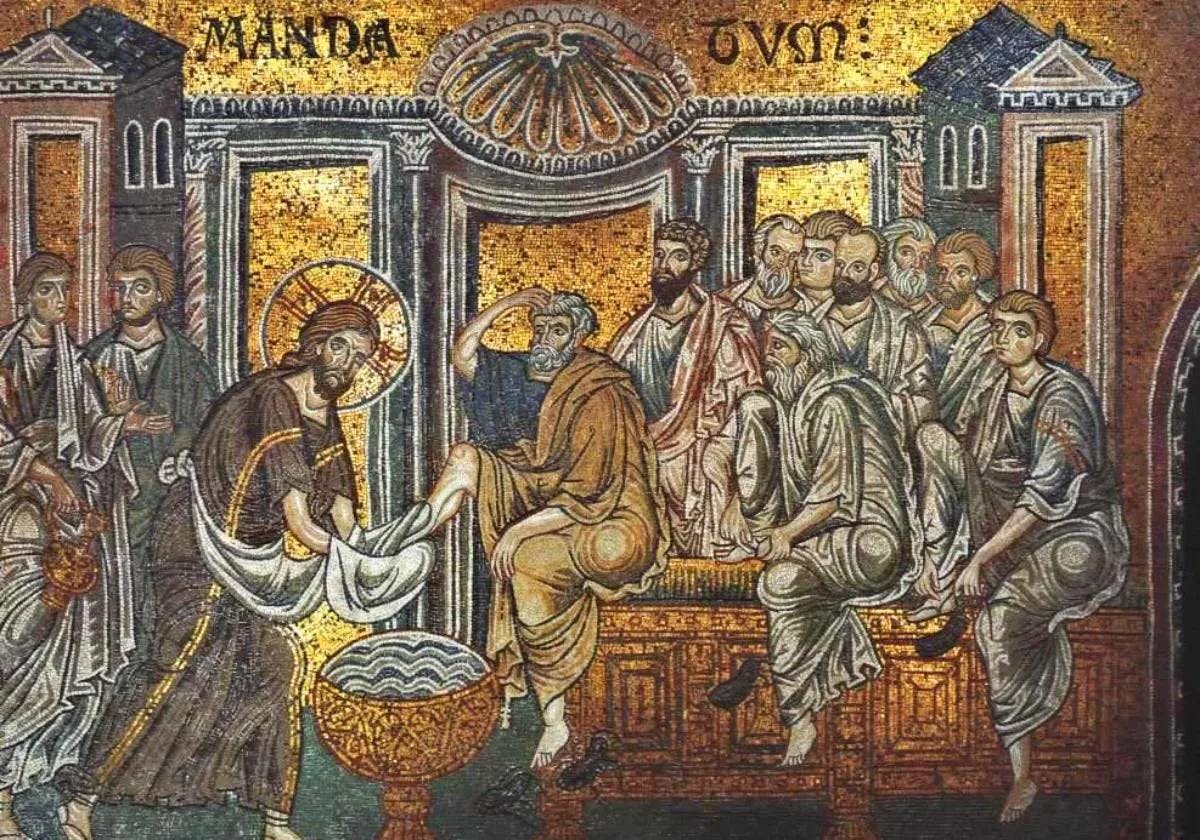
Maundy Thursday's name comes from the Latin word 'mandatum', which means 'commandment'. It was only the Thursday before His crucifixion that Christ initiated the Last Supper, which He commanded them to do in reemergence of Him. We also remember Christ's commandment to love one another. It was also in this room that Christ humbly lowered Himself and washed the feet of His disciples.
This evening marks the start of the three-day celebration of Easter, beginning with the last supper of Jesus Christ and culminating in his resurrection. We reflect on the acts of Jesus and his message of love, humility, and sacrifice. The day serves as a poignant reminder of the foundational principles of our Christian faith and its great need in our world today.
Almighty Father, whose dear Son, on the night before he
suffered, did institute the Sacrament of his Body and Blood:
Mercifully grant that we may thankfully receive the same in
remembrance of him who in these holy mysteries giveth us a
pledge of life eternal, the same thy Son Jesus Christ our Lord;
who now liveth and reigneth with thee and the Holy Spirit
ever, one God, world without end. Amen.
- Maundy Thursday, BCP 169
The Services
Foot Washing: This is powerful symbol of humility and service, the foot washing ceremony reenacts Jesus' washing of the disciples' feet, embodying his commandment to love and serve one another.
Eucharistic Service: This special service commemorates the Last Supper, where Jesus instituted the Eucharist. We will partake together of the Eucharist as Christ's disciples did. We participate mystically in the original event as we receive.
Stripping of the Altar: The altar will be stripped bare, and all ornamental decorations will be removed, reminding us of Christ's abandonment and vulnerability. We are preparing for the solemn observance of Good Friday.
Good Friday: The Passion of Christ
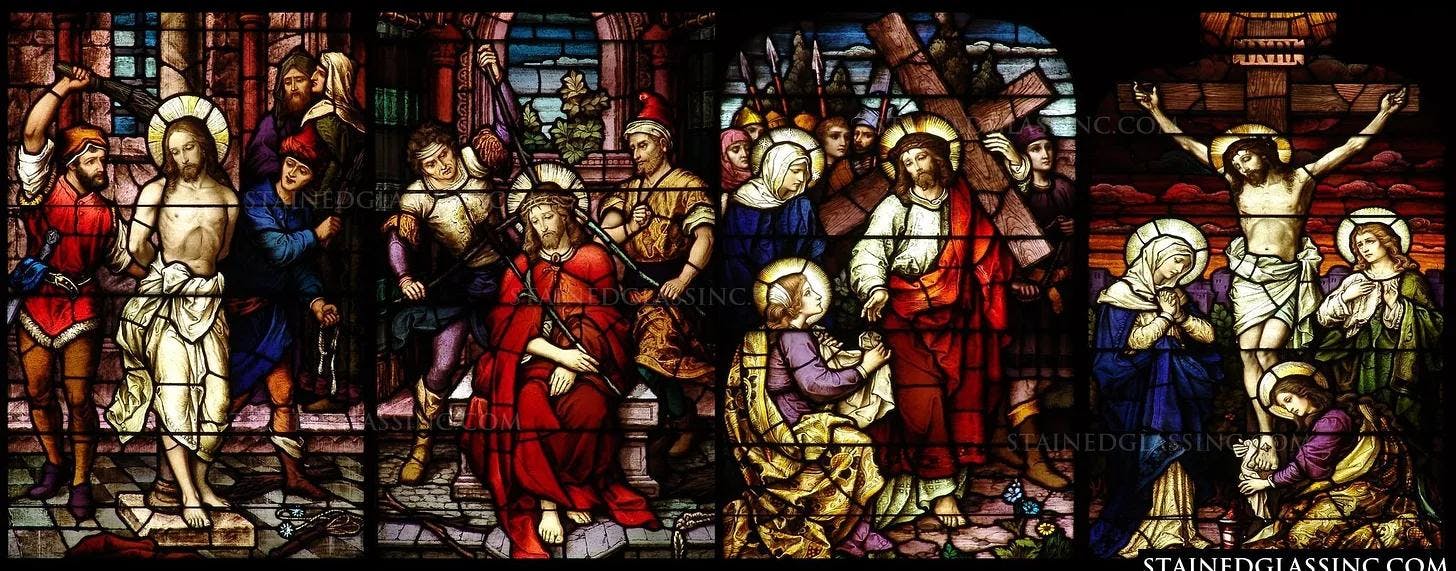
I know, Good Friday sounds like a paradox given what we're observing. The crucifixion of our Lord hardly seems "good." The name likely comes from the Old English word "gōd" which is an older form of the word "holy". Another idea is that it is called "good" because it marks the fulfillment of God's plan for humanity's salvation. Through Jesus' death and subsequent resurrection, Christians believe that he provided redemption and forgiveness for their sins. In this sense, the day is "good" because it represents the ultimate expression of God's love and sacrifice for humanity. The crucifixion is seen not as a defeat but as a triumph over sin and death, paving the way for the resurrection and eternal life.
On Good Friday, we delve deeply into the somber reflection of Jesus' Crucifixion, a day marked by profound reverence and contemplation within our tradition. The altar is left empty and bare, the cross is venerated, and the Passion narrative from the Gospel of John is read. Some churches also hold a service called the Stations of the Cross, which involves prayers and meditations on various events from Jesus’ trial to his burial.
Almighty God, we beseech thee graciously to behold this thy
family, for whom our Lord Jesus Christ was contented to be
betrayed, and given into the hands of sinners, and to suffer
death upon the cross; who now liveth and reigneth with thee
and the Holy Ghost ever, one God, world without end. Amen.
- Good Friday, BCP 169
Solemn Collects
We'll pray the "Solemn Collects" which are prayers specific for Good Friday focus on the Church, the clergy, those preparing for baptism, the unity of all Christians, unbelievers, our civil leaders, and those who suffer.
Veneration of the Cross:
A solemn lifting and display of the crucifix, inviting individual veneration, symbolizing a personal connection to the events of the Crucifixion.
Holy Communion:
Distributed from the Reserved Sacrament, consecrated on Holy Thursday, reflecting the continuity of the Holy Week observances.
Stations of the Cross and the Agony Prayer Service
The Stations of the Cross and the Three Hours' Agony prayer service offer us an opportunity to immerse ourselves fully in the events of Good Friday, fostering a deepened engagement and active participation in Christ's Passion. These prayer services move us beyond mere remembrance of Christ's suffering and crucifixion, inviting us to participate in and meditate on His sacrifice, love, and redemption, so that we may draw closer to Him and understand the depth of His love and sacrifice for us.
Holy Saturday and the Easter Vigil
Holy Saturday and the Easter Vigil are profound moments of reflection and anticipation within the Anglican tradition, marking the transition from the sorrow of Christ's death to the joy of His Resurrection.
O God, Creator of heaven and earth: Grant that, as the
crucified body of thy dear Son was laid in the tomb and
rested on this holy Sabbath, so we may await with him the
coming of the third day, and rise with him to newness of life;
who now liveth and reigneth with thee and the Holy Spirit,
one God, for ever and ever. Amen.
Holy Saturday, BCP 170
Holy Saturday: A Day of Waiting
Coming from the East, I still remember Holy Saturday as the "Harrowing of Hell". We reflect on that and Christ's time in the tomb.
On Holy Saturday, we'll light a new fire, bless the new Paschal candle, renew our baptismal vows, and celebrate the light of Christ overcoming the darkness.
Easter Vigil: The Night of Light
This service begins Saturday night, in the hours of darkness, reminding us the world waited in darkness for the coming Messiah and then for the Resurrection.
The Paschal candle will be lit from the new fire and we'll welcome Christ as the light of the world into our midst.
Our parishes will be decorated again and the clergy will wear bright vestment so that all we see reflects the importance and joy we have.
Easter Sunday: Resurrection and Celebration
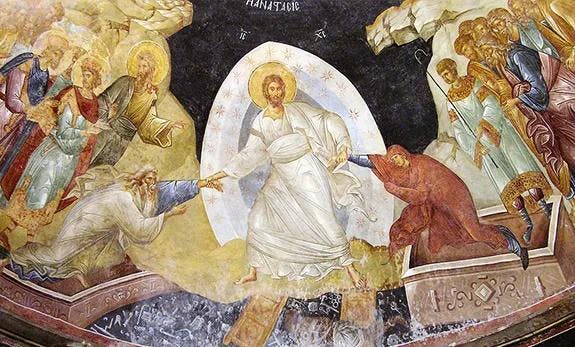
Finally, Easter. Easter Sunday ushers in a day of absolute joy and celebration within all Christian traditions. We celebrate the Resurrection of Jesus Christ, God incarnate, the Second Person of the Holy Trinity, fully God and fully man from the dead. This is the single greatest event in history and we celebrate it with joyous services, the singing of hymns, and the heartfelt exchange of the Easter greeting, "Alleluia! Christ is risen!"
Easter Sunday Services: Many parishes begin with an early morning service, followed by the Mid-morning Eucharist, where congregations come together to celebrate Jesus' resurrection through prayer, song, and the Eucharist.
O God, who for our redemption didst give thine
only-begotten Son to the death of the cross, and by his
glorious resurrection hast delivered us from the power of
our enemy: Grant us so to die daily to sin, that we may
evermore live with him in the joy of his resurrection; through
the same thy Son Christ our Lord, who liveth and reigneth
with thee and the Holy Spirit, one God, now and for ever.
Amen.
Easter Sunday, BCP 170
Easter is Just the Beginning
Easter Sunday is a glorious feast day, but it is just the beginning - the next 50 days are known as Eastertide, kicking off a 50-day period of feasting and celebration. This season represents the high point of the Church Year, as we await Ascension of Christ and the coming of the Holy Spirit on the Day of Pentecost. It's a time for Christians to reflect on Christ's Resurrection's and what it means for all of creation, giving us the reason for our faith and letting it change who we are.
A Wrap Up
Throughout this guide, we've journeyed together from the hopeful triumph of Palm Sunday through the solemn reflection and anticipation of Holy Week, really looking into the events of Maundy Thursday and Good Friday, and finally emerging into the light of Easter Sunday. Along the way, we've encountered the rich traditions, readings, and rituals that mark these holy days within the Anglican tradition, each step drawing us closer to the heart of Christian faith: the Passion, Death, and Resurrection of Jesus Christ. This pilgrimage through Holy Week offers us more than just historical insights or religious observance - it invites each of us into a deeper, more personal engagement with our faith.
May these lessons in humility, service, and sacrificial love exemplified by our Lord in these days stay with us. As we transition from somber reflection to joyous celebration, may our Christian journey embody the renewal and hope we have. By actively and prayerfully participating in this holy time, I hope we reaffirm our commitment to the path laid out by Christ, rooted in love and culminating in the joyous proclamation: "Alleluia! Christ is risen!" May this guide serve as a beacon for us navigating the profound mysteries of Holy Week, encouraging a deeper, more vibrant engagement with our faith and with each other in the Anglican community and beyond.
About Fr. Thom Crowe
I'm Fr. Thom, a priest in the Episcopal Church/Anglican Tradition. I spent 5 years as an ordained deacon in the Orthodox Church. By day, I'm a tech marketer, dad to a sweet girl, and husband to a great wife who runs the Made Shop. I'm an avid reader, beer aficionado, lover of theology and history, and insufferable coffee snob. I have a pretty happy life here in Tulsa, OK.
